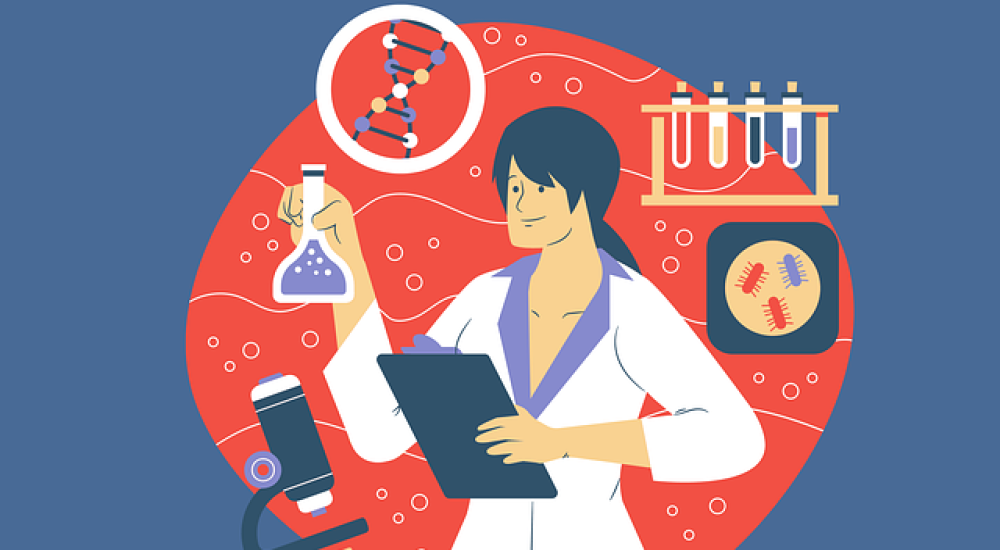Basic Idea
The first point of differentiating between these fields would be to understand the basic idea of them. Biological sciences is a branch of natural sciences that involves studying living systems. Biologists study living systems like cells, tissues and biomolecules at a very fundamental level, and also study about the recent discoveries in these fields and their applications. Biologists have the opportunity to study
- Animals(including humans)
- Plants
- Microbes
- All other life forms.
Medicine is a very specialized portion of Biological sciences that deals with Health care limited to only humans.
In general, medicine refers to MBBS which pertains only to humans (which is the thing we are focusing on in this post) but Medical care of animals (veterinary science) also falls under the same umbrella of medicine. It usually involves applying existing knowledge in the diagnosis, prevention & treatment of diseases with a major focus on practical application. However, doing this requires in-depth clinical knowledge (of medicines, diagnosis & treatment), something that a biologist would not normally have. MBBS students could also be involved in research, but that research is mostly clinical application-based.
Understand the career paths in these fields
Career paths in Natural Sciences Biology
The two broad options a biology student has are research and teaching. Research in Biological sciences has a wide variety of specialisations- genetics, cell biology, evolution, neurosciences , to name a few. In order to enter the field of research, one must have a B.Sc, M.Sc degree ( or BS-MS) followed by a PhD.
Teaching at the school or college level is another option. For this, a Masters degree is the minimum requirement, however many colleges now prefer a PhD for a professor’s position. A B.Ed may be required for school teaching.
Graduates in biological sciences or biotechnology also have some job opportunities in the fields of pharmaceuticals and biotech firms, however, job prospects are limited. One can enter the field of scientific and environmental policy making, environmental conservation, and industry- specific research (which involves researching for a specific corporate company).
Career paths in Medicine
the majority of people who pursue MBBS become doctors, either working in government/ private sector hospitals, or having their own independent clinic. They can also specialise or sub-specialise as physician or surgeon or diagnostician(such as radiologist) or non-clinical/research doctors. The basic idea however, is patient care. In most cases, one needs to have a MD/MS degree after MBBS.
Some people can also choose to become faculties teaching medicine in medical colleges along with practising in the same hospital. Faculties do a whole range of things like teaching, training of Jr. doctors, researching, and managing hospitals.
Another option would be to enter research and academia after doing MBBS/MD. The ways to do that are slightly limited, but are very much possible.
Financial implications of these career paths
- MBBS– Usually gives more financial stability in a shorter time. Patient to Doctor ratio is still very high in India and there is a constant focus on building new hospitals, so the demand for doctors is also relatively high. Many doctors start their independent practice, which also has good financial stability. But over a decade or two this field seems to be saturated with doctors, thereby affecting the financials. You start early and attain a stable income but it is not like you can scale it up like you could with software or an MBA graduate. You hit a plateau very soon unless you run a hospital yourself and keep scaling it up.
- Biology– Starting paid work in the field of biology requires a longer period, i.e, 8-10 years of education, before one gets a paid position. In case of research, the stipend and grants given to a PhD, postdoctoral researcher, or junior researcher, varies widely with the country, institution, and the area of work. On an average, the remuneration they get is lesser than that of a practising doctor, and the career path may not be as stable . The financial conditions for teaching or other jobs are more stable, but they also vary widely depending on the above-mentioned conditions.
Learn about the entrance exams and admission process
- MBBS admission– This requires cracking the NEET entrance exam, which is a highly competitive exam requiring intense preparation. For securing a seat in a good government college, a high score is necessary.
- BSc/ BS admission- There are a large number of institutes offering this degree, therefore the admission process varies widely.
To give a broad overview of these institutes:
- There are some important entrance exams that give admission to prestigious national institutes( IISC, IISERs, NISER): KVPY, IAT, NEET, JEE, NEST.
- Many universities have their own individual admission tests, for example, CUET, Christ University admission test, Presidency University admission test. These are largely based on the plus two standard coursework and are relatively simpler than the abovementioned entrances.
- Many colleges take admission on the basis of 12th board exam marks. Some colleges have very high cutoffs, above 96-97%. Others have more moderate cutoffs for admission.
- Some institutes have a system of an interview, or submission of a personal statement written by the applicant, e.g. Ashoka University, St. Stephens college, Christ University. However, these components form only a small part of the admission criteria.
Overview of the coursework
The fourth important point of differentiating would be to get an overview of the coursework involved. The coursework of both is different from the high school standard biology, however, the fundamentals of concepts do not change. So, knowing the coursework will help one correlate with the topics they have an interest in high school.
MBBS coursework- 4.5 years academic studies and last year is a clinical internship.
–1st year- basics of anatomy, physiology, biochemistry.
–2nd year (1.5 years) :
a) pharmacology- drug mechanisms, side effects, uses.
b) microbiology- microbes, their identification, disease diagnosis.
c) pathology- changes that occur in organs in diseases, tissue level impact of diseases, histopathology and growth pathology
d)forensic medicine- medical knowledge with a legal perspective, postmortem changes,medical jurisprudence, forensic toxicology about poisons and antidotes.
–3rd year onwards, core clinical subjects are taught, which include: ENT, ophthalmology, preventive & social medicine.
–4th year: Medicine, Paediatrics, Surgery, Gynecology & Obstetrics, etc.
A total of 19 subjects are taught in 4.5 years along with clinical and bedside teaching every morning in the hospital. Radiology, Anesthesiology and Orthopedics are included in the core subjects mentioned above.
B.Sc/ BS coursework- There are a variety of different courses and combinations that are available at the undergraduate and postgraduate level, having different focus areas and topics. One can pursue a degree in Zoology, Botany, Microbiology, Biotechnology, or even a general degree in Biological Sciences (which has a combination of different topics in biology). Some of the areas such courses cover are: Genetics, Cell Biology, Molecular Biology, Physiological processes, biochemistry, animal or plant ecology, Evolution. There are also many other specific topics and practical skills taught to such students. Moreover, some institutes give students the choice to study physics, chemistry or maths courses as electives as well. Institutes like IISERs very specifically give students exposure to other branches of science before allowing specialisation in biology. This interdisciplinary approach is also important if one’s interests align with it.
Summary
To summarise, an MBBS degree looks at every topic from a purely clinical perspective, while in a natural sciences degree, the concepts are more fundamentally explained. In the long run, it is also important to have an idea about the lifestyle of a doctor or a researcher. These professions are completely different and each has its own pros and cons.
For doctors, working in a hospital setting, especially in government hospitals or clinics, can be stressful. The infrastructure in district-level hospitals isn’t always great and the patient inflow in government hospitals is much more, leading to a burden on doctors. The workload depends on the specialization of the doctor as well. Junior doctors often have to work multiple shifts to keep up with the patient inflow. However, the financial benefits and professional stability it offers is much better than many other professions. If someone is essentially dedicated to caring for patients, then they will remain motivated even in challenging circumstances.
For someone in research and academia, their career path is never linear. They have to be associated with multiple different institutes or different labs during the course of their work. Since academia does not have a well- defined “office hours” as such, maintaining work-life balance can sometimes be difficult. The stipend given is not as high as the salary of a corporate employee, and getting research funds is sometimes a difficult process. However, the core motivation of a researcher is the curiosity and interest they have in a specific topic. They get the freedom and support to explore that topic, and they remain dedicated to this field because of this academic freedom and exposure they get.
Conclusion
In conclusion, we can say that Medical Science and Biological Science are fundamentally two very different branches requiring very different mindsets, aspirations and interests. If someone is passionate about patient care, clinic duty, is fascinated by human physiology, and, most importantly, is willing to lead a life dedicated to dealing with patients, then MBBS is a good option for them. On the other hand, if someone wants to explore the fundamentals of biology, wants to learn more about molecular mechanisms, genetics, neurology, ecology and so on, and is really passionate about doing research, then choosing a degree in biological sciences should be their priority.
Who made this post happen?
Since this post needs people knowledgeable in both Biology and Medicine we approached people from both backgrounds. Below is the list of those people, we are extremely grateful to them for making this happen.
| MBBS | Natural Science |
| Dr. Nishanth Khurana, MBBS, AIIMS Rishikesh Dr. Yashwanth Edadasula, (The name might sound very familiar to CoS readers) DNB (Pediatrics), MBBS [RIMS, Srikakulam] Dr. Jubair Shamis, MBBS, AMU | Sailee Sakhlakar, Ph.D. Scholar, Charles University. (Past) Erasmus Mundus Scholar Damayanti Dasgupta, BSc student, Miranda House, Delhi University Mr. Ritam Pal |
Editied and modified – Shruti Pandharipande
Feature Image – Rimsha Arif







